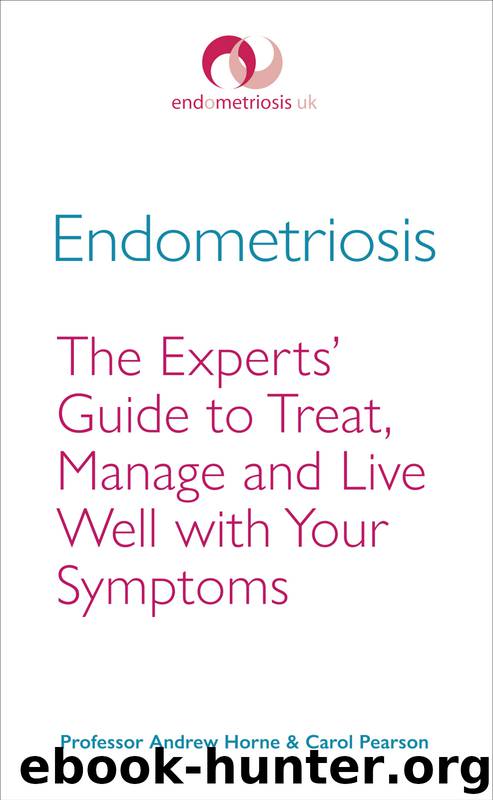Endometriosis by Andrew Horne

Author:Andrew Horne
Language: eng
Format: epub
Publisher: Ebury Publishing
Endometriosis centres and the multidisciplinary approach
There are lots of gynaecology departments in hospitals across the UK and some have developed specialist knowledge and experience in endometriosis, along with a multidisciplinary team. In the UK, for example, the British Society for Gynaecological Endoscopy (BSGE) currently accredits endometriosis centres, and you can see where centres are on their website (see resources section here).
As its name suggests, a multidisciplinary team means that the centre has built up a team of people with different skills, and this ensures they can support even the most complicated surgery. For endometriosis, the multidisciplinary team will comprise gynaecology surgeons who specialise in endometriosis, colorectal (bowel) surgeons, urology surgeons, pain-management experts and endometriosis clinical nurse specialists.
But in terms of getting referred, GPs may not know about endometriosis centres which can mean accessing the right care quickly can be hard.
If you are looking at symptoms such as pain or infertility, there may be a balancing act – does your GP try and find the quickest referral route, or the most appropriate service? What are the woman’s priorities?
GPs will often look for quick referral routes, but they are under huge amounts of pressure and face frustration; they are acutely aware that they have limited resources available to them and need to refer appropriately. Consultant gynaecologist, Dominic Byrne describes the issue: ‘At the moment the challenge would be to make it a level opportunity for all patients. Patients who live in Cornwall will find me, but if they live somewhere else, they may find that they haven’t got someone who would undertake this type of surgery. Also their local GP or practice nurse, or whoever they talk to, isn’t aware of what can be done, so there can be a lack of referral, not because of any intransigence, just actually a lack of understanding of what’s available.’
It’s extremely important for a woman to ask questions and take time to consider the options at every step of their treatment, particularly when considering surgery. Although accessing the right care doesn’t always happen quickly and navigating the system can be difficult in some areas, knowing what can be available is empowering. Dominic Byrne tells us he uses the analogy of cancer services to describe what should happen in terms of being referred to the right place: ‘Most gynaecologists now have a fairly well-developed pattern of referral for cancer. If they looked inside someone’s abdomen, saw it was cancer, they wouldn’t have a go and try and remove the bits they could and then send them to the cancer team; they would just stop at that point, say this is cancer, and then send them to the specialist team. We need to try and get gynaecologists to mirror that philosophy in deep endometriosis and then more patients will be signposted to the correct place first time or at least earlier on.’
Thankfully, more of this is happening now than previously. Andrew Kent explains: ‘The concept of centres for the treatment of endometriosis is slowly gaining traction but
Download
This site does not store any files on its server. We only index and link to content provided by other sites. Please contact the content providers to delete copyright contents if any and email us, we'll remove relevant links or contents immediately.
Anastasia (The Ringing Cedars of Russia Series - Book 1) by Vladimir Megre(795)
Sea of Fertility 1 - Spring Snow by Yukio Mishima(779)
Healing PCOS by Amy Medling(756)
Spring Snow by Mishima Yukio(752)
The PCOS Plan by Nadia Brito Pateguana(749)
Avalanche by Julia Leigh(739)
Fertile by Emma Cannon(729)
Taking Charge of Your Fertility : The Definitive Guide to Natural Birth Control, Pregnancy Achievement, and Reproductive Health (9780062409911) by Weschler Toni(722)
Penis Power by Dudley Seth Danoff(719)
IVF by Susan Bedford(705)
Endometriosis by Andrew Horne(653)
Fertility Wisdom by Angela C. Wu(651)
How Change Happens by Duncan Green(647)
Motherhood Reimagined by Sarah Kowalski(643)
The PCOS Diet Plan by Hillary Wright(616)
Life in the Fasting Lane by Jason Fung(603)
Scattered Seeds by Jacqueline Mroz(579)
Fully Fertile by Tami Quinn(576)
Conceivability by Elizabeth Katkin(575)
